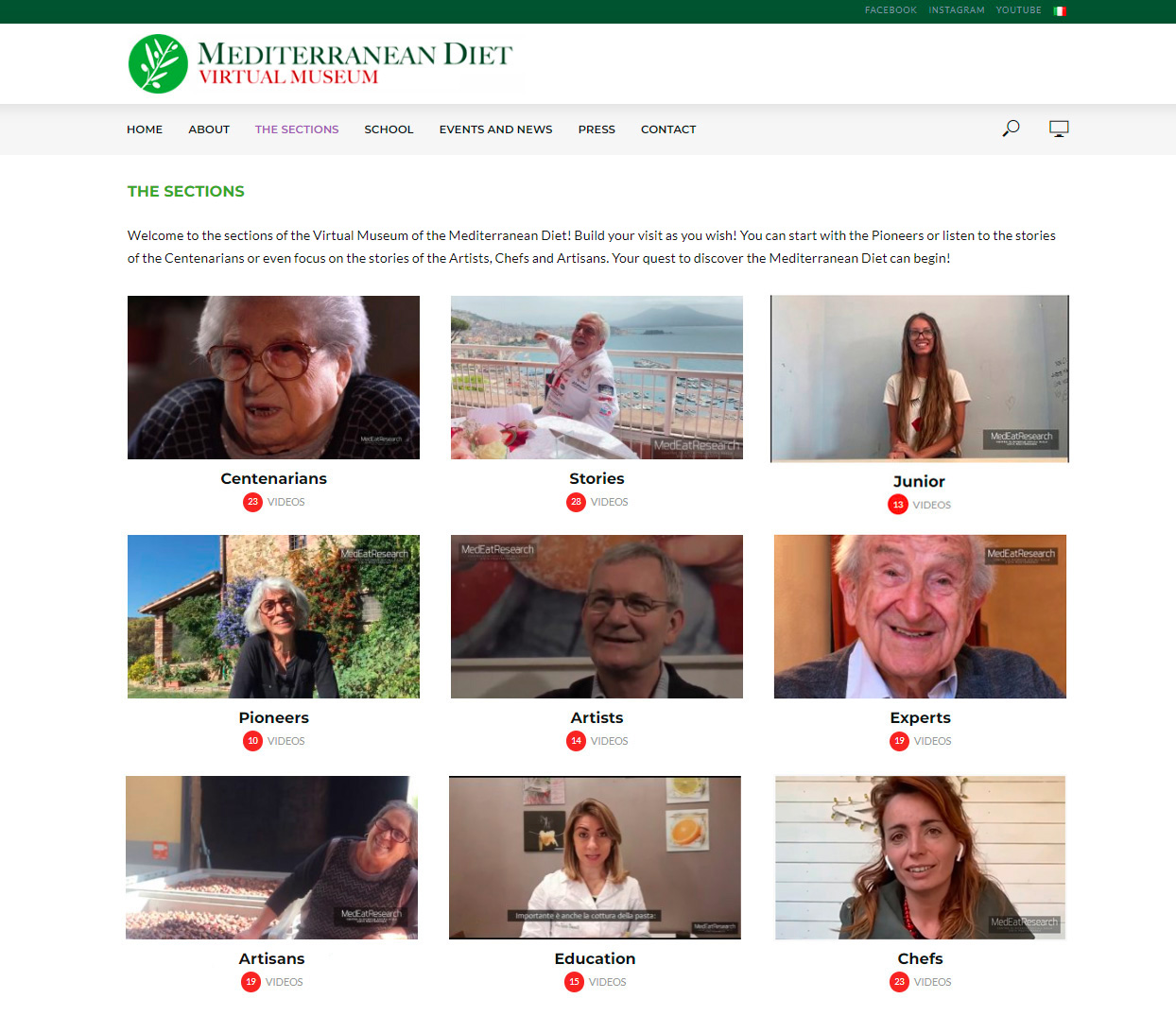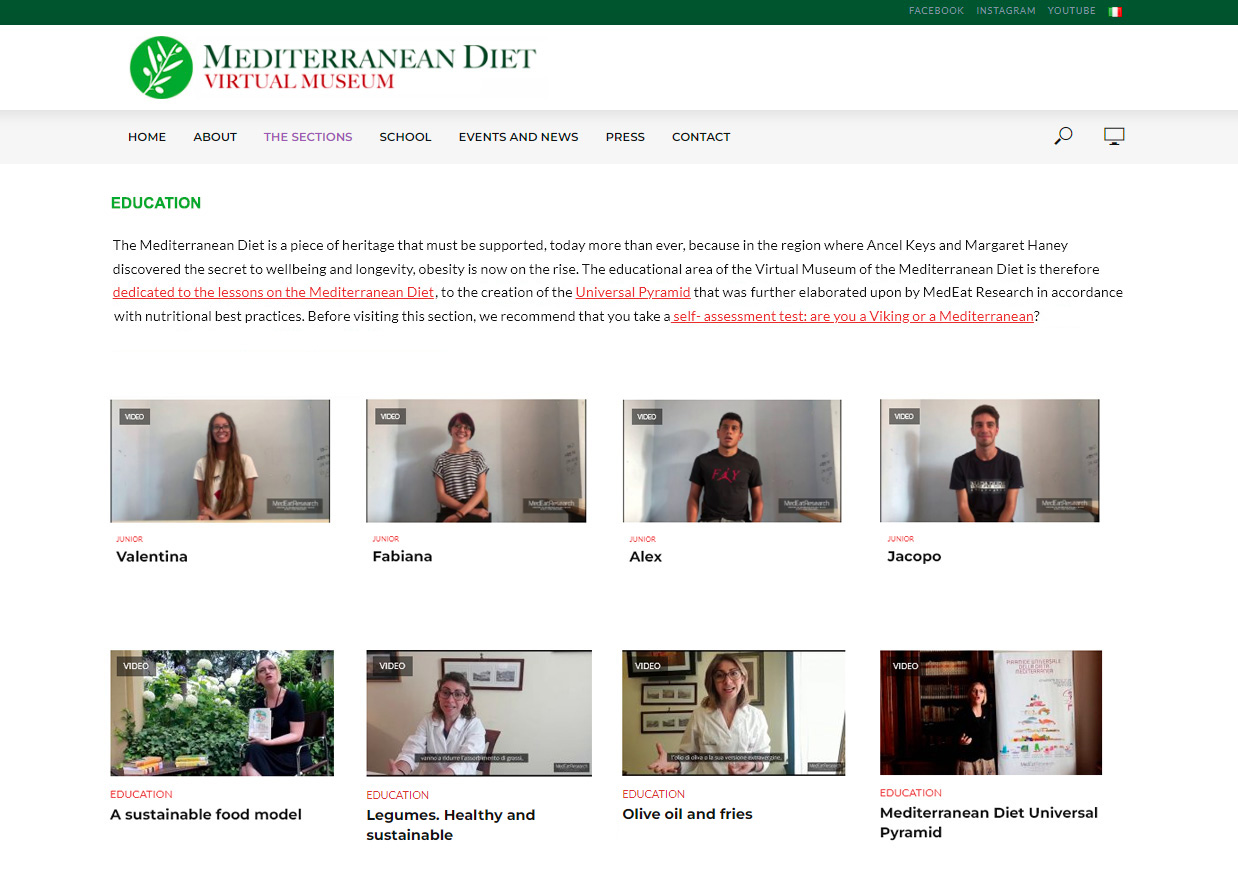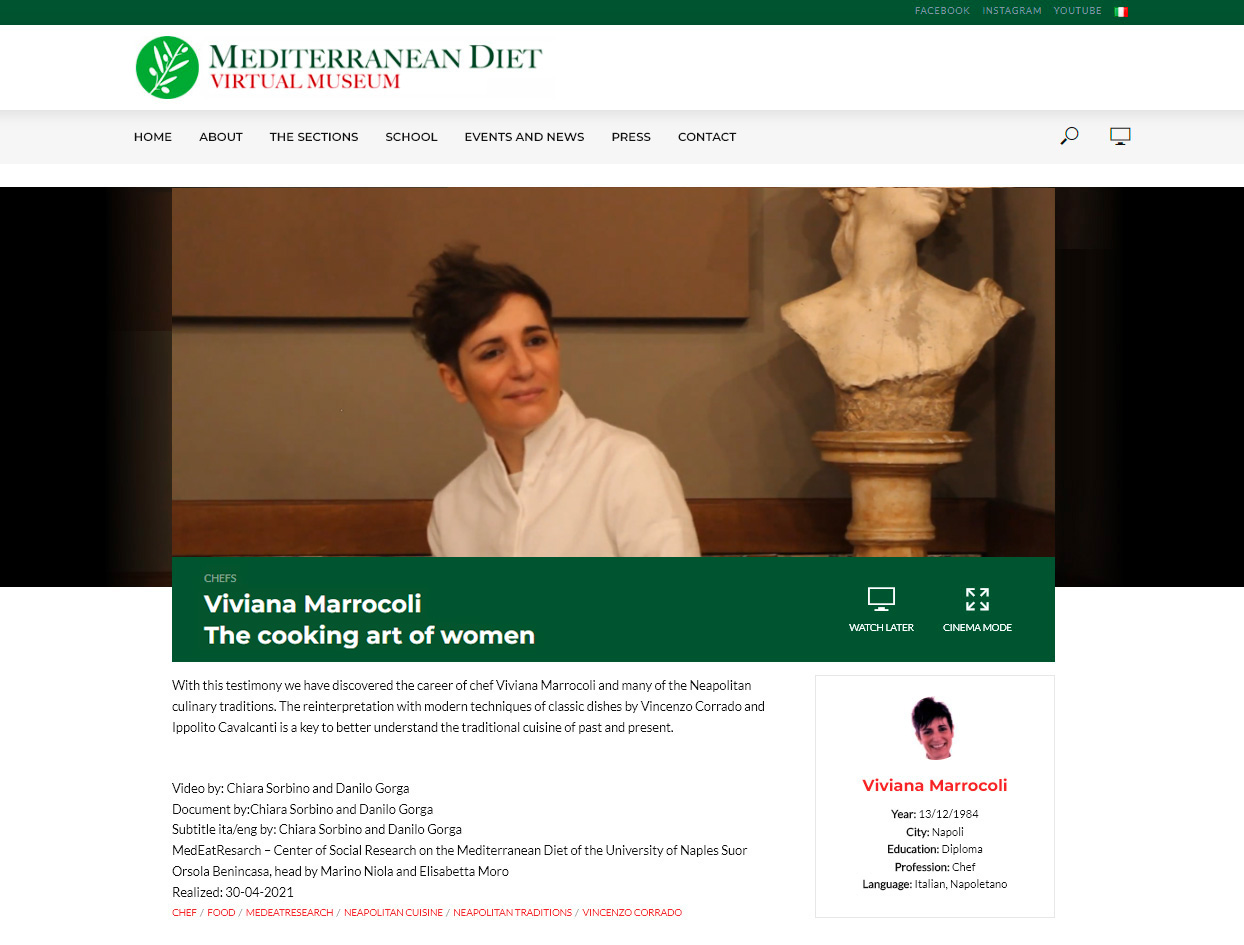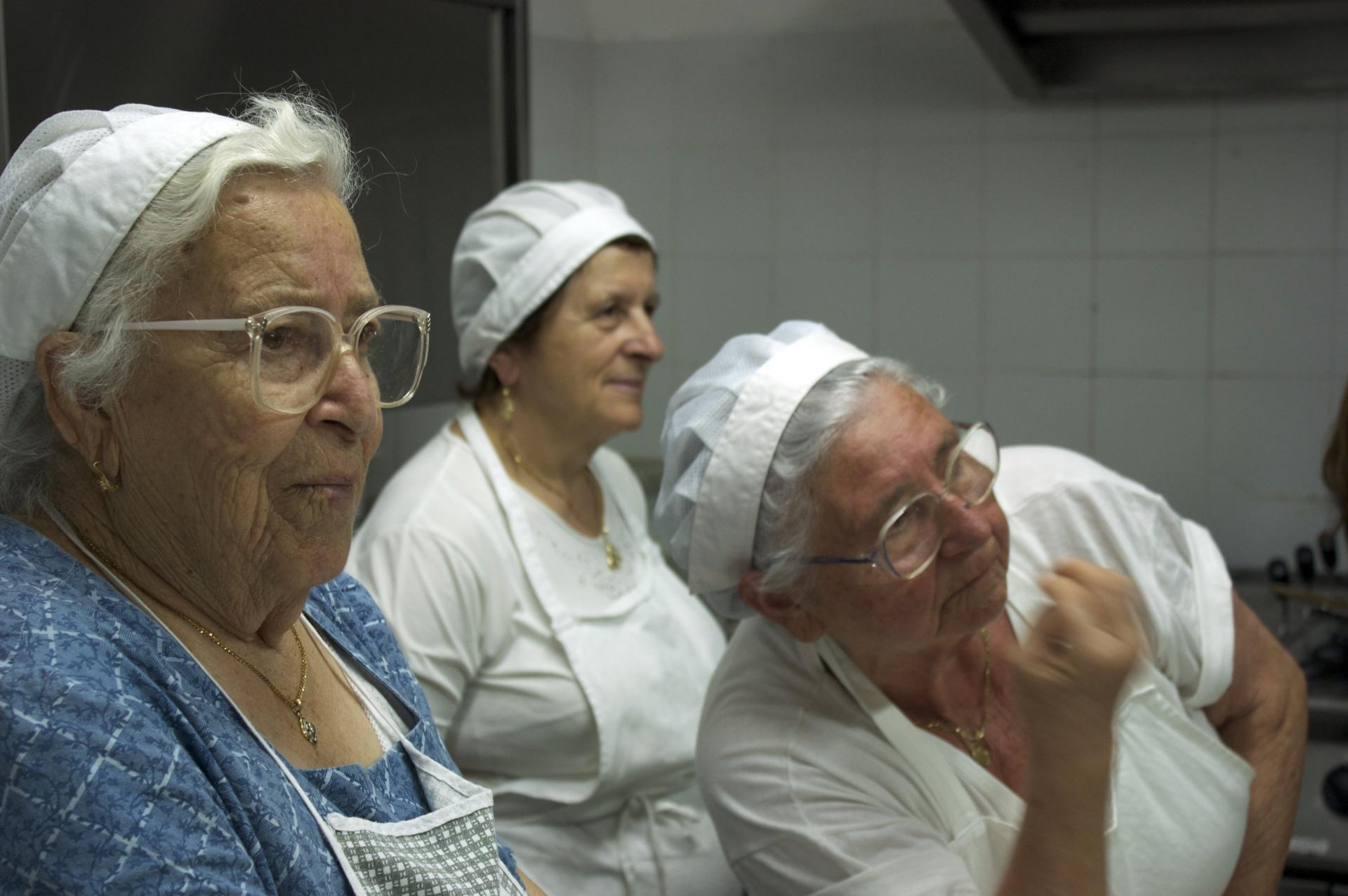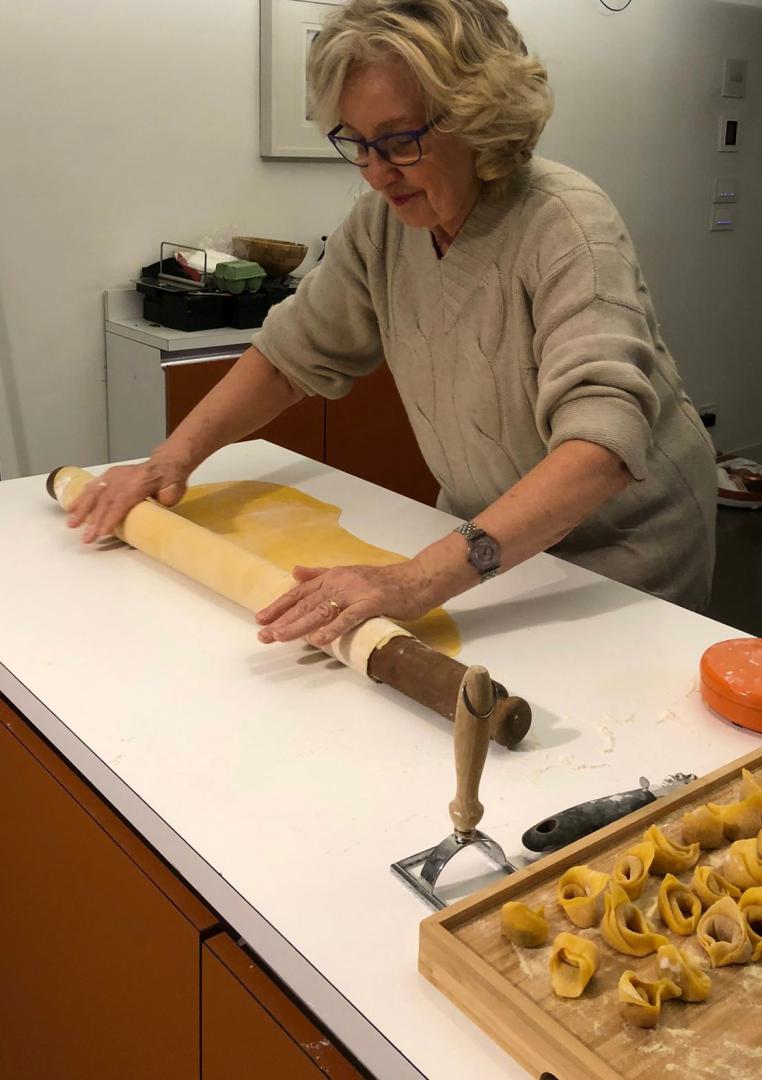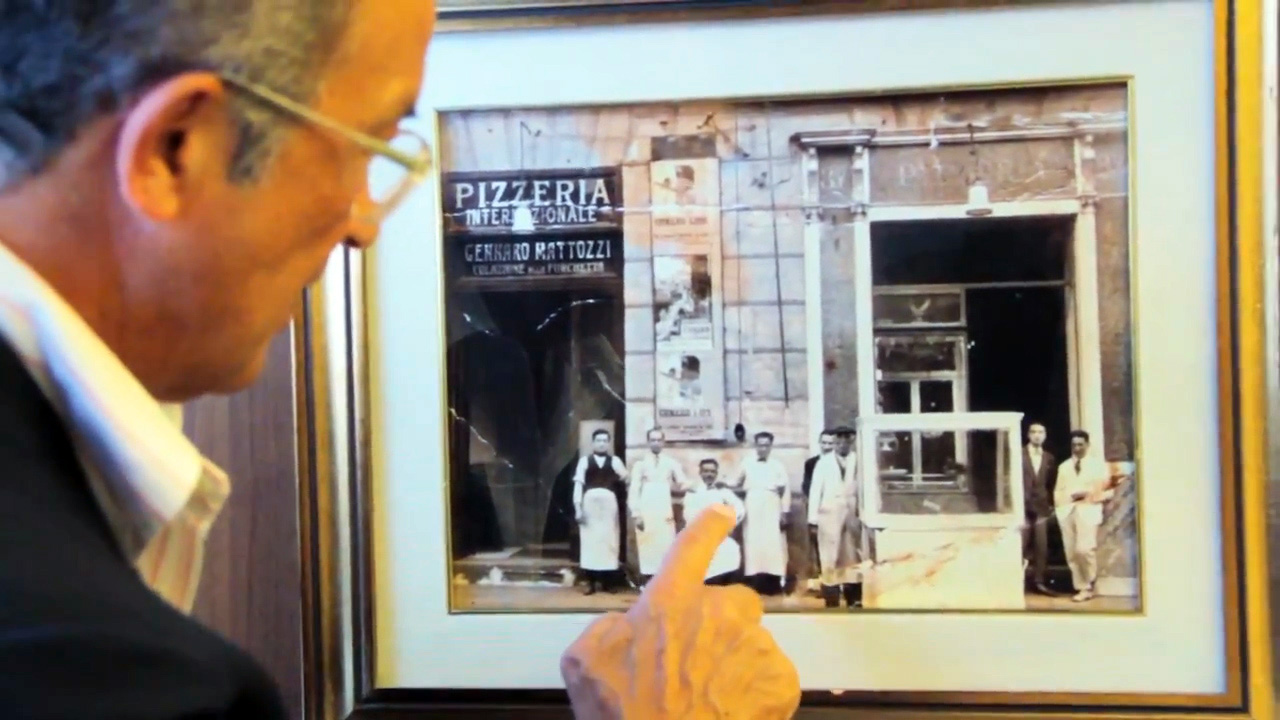Mediterranean Diet Virtual Museum (MDVM)
Basic information
Project Title
Full project title
Category
Project Description
The Mediterranean Diet Virtual Museum is a web project for collecting and digitizing memories related to the Mediterranean Diet. It includes short videos on the history of the Diet, clips on nutrition, and over 150 video interviews. The Museum is the virtual open space of MedEatResearch, Center for Social Research on Mediterranean Diet of the University Suor Orsola Benincasa, whose aim is sharing Southern Italy's food heritage and encourage the cultural exchange among Mediterranean countries.
Geographical Scope
Project Region
Urban or rural issues
Physical or other transformations
EU Programme or fund
Which funds
Description of the project
Summary
The Virtual Museum of the Mediterranean Diet (MDVM) is a web based project for collecting and digitizing memories related to the Mediterranean Diet (MD) cultural heritage and life style. It is an initiative of the MedEatResearch, the Center for Social Research on the Mediterranean Diet of the University of Naples Suor Orsola Benincasa, whose aim is to value and promote the Mediterranean Diet as a UNESCO Intangible Cultural Heritage of Humanity, and encourage the cultural exchange of knowledge, traditions, stories among Mediterranean countries.
The Museum is free, open access and accessible in Italian and English. People interviewed come from many different countries and cultures (Italy, France, Greece, Portugal, Spain, Great Britain, Netherlands, Belgium, Japan, U.S.A. etc.)
The Museum hosts 164 video interviews on the history of the MD, and educational clips on nutrition. In the actual form it has been fully implemented in the last months of 2021 with the video series related to the sections: Chefs, Artisans, Stories.
The Museum has 9 different Sections: 1. Pioneers: Scientists and common people who cooperated in the discovery and study of the Mediterranean Diet and its benefits for health; 2. Centenarians: People of the area of Cilento (UNESCO emblematic community) who are like “living libraries”, giving evidence of this life-style as an elixir of youth; 3. Chefs: Women and men who keep alive culinary traditions; 4. Artists: Actors, photographs, painters, film makers, musicians whose work preserves the social values of the MD; 5. Junior: A collection of video-interviews made with the collaboration of the Z-Generation in an inclusive, inter-generation and dialogic perspective; 6. Experts: Professionals of food and wine in the field of catering and production; 7. Artisans: Producers and craftsmen of food and defenders of local biodiversity 8. Stories: Examples by the Mediterranean life-style; and 9. Education: Clips about nutrition and MD history.
Key objectives for sustainability
The Mediterranean Diet Virtual Museum is strongly committed to promote sustainability since it disseminates the cultural heritage of the Mediterranean Diet (MD). According to FAO, this lifestyle is one of the most sustainable diets in the planet because it is characterized by a prevalent consume of cereals, vegetables and fruit; low consumes of meat are provided in favour of a frequent consume of legumes/pulses and fish, with a preference for blue fish, which has a lower environmental impact; its main fats are not-animal fats like olive and seeds oil. So, in its basic features MD promotes a green approach to nutrition and environment.
By following the seasonality of products, the Mediterranean cuisine recognizes a great value to local products and biodiversity. In MD recipes, the reuse of food leftovers in name of circularity and a zero-waist strategy is common. It’s well known that an increasing adherence to MD would immediately produce a reduction of environmental pollution, a lower carbon footprint, better health condition for individuals, longer life expectancy for the population. So, the life-style incorporating the MD values would help the public health of citizens and the reduction of health care costs. Engaged in promoting a larger awareness about this life-style and tradition-based values, the Museum works as an excellent promoter of sustainability.
Coherently, sustainability is an inherent value of the Museum itself. The project is web based and promote an immaterial and paper free approach. By maximizing the opportunities offered by the new technologies, the project has no environmental impact and takes care of environmental aspects related to sustainability in all moments of its implementation, from the selection of the material to share to the communication campaigns.
As virtually embedded form of environmental sensitivity, the Museum works as an exemplary model for any cultural project aiming at sharing awareness about immaterial heritage.
Key objectives for aesthetics and quality
The Mediterranean Diet (MD) was declared by UNESCO a “Cultural Intangible Heritage of Humanity” in 2010. In the UNESCO nomination the fact that the Mediterranean Diet is a traditional lifestyle involving many different cultures of the Mediterranean basin with its roots in a wide heritage of rituals, music, arts and craft, literature, pictures, dances, theatre and media is explicitly stressed. MD is an embedded heritage going from the landscape to the table, and viceversa, and is a particular way of inhabiting the planet, with a specific aesthetics which shapes fields, hills, see shores, trees, but also “the human landscape” making up by relations, friendships, identity, history. Plus, it is a particular and distinctive way of shaping houses, gardens, vegetable gardens, tools, objects, artistic works, design, calendar, and time. To transmit the richness of this cultural heritage the Museum has a special section named "Artists", dedicated to international artists using different aesthetic canons and different art languages, like photography, writing, performances, video and movie, design. Their video interviews show the special connection that interrelates artistic inspiration to natural and social habitat. Furthermore, they enlighten how their artistic work received inspiration from the Mediterranean history and food-centered philosophy of life. Promoting both the food beauty and the asthetics of food, the Museum points out the fact that cooking itself is an artistic practice, which involves taste, sensitivity, creativity, body and mind. Consequently, a section is dedicated to the Mediterranean Chefs. Their stories and ideas, recipes and thoughts, help the visitor to learn more about the Mediterranean culture and lifestyle.
The Museum is fully non-profit: no advertising is allowed. The Museum mission is to promote the combination of aesthetics and quality of life as the dual expressions of the same style-life recognized as Intangible Heritage of Humanity.
Key objectives for inclusion
The Mediterranean Diet Virtual Museum (MDVM) is a fully open access project, so promoting the largest form of inclusion. It disseminates interviews of people living in the area of the Mediterranean See explaining in many ways the special vocation of the Mediterranean Diet (MD) for inclusion, in particular focusing attention on conviviality, the mantra of MD, which means to share through food and meals time, emotions, experiences, future projects and social practices with others. People interviewed underline the great social value attributed in MD lifestyle to ceremonies, rites, feasting in large groups of familiars and friends, with the explicit purpose to enlarge the community by new people and reinforce social interconnection and solidarity. The narration of recipes, traditions, practices, cooking technics inform the visitor of the museum that MD is a lifestyle accessible by all social classes because of its low-cost food products and its easy and fast way of cooking.
In this framework of values, the Museum mission is to safeguard and disseminate the memories of people of any gender and generation, with a particular attention to centenarians, elder people, Z-generation, and low educated persons. The purpose of inclusion works as a criterion for the selection of material to publish, supported by a principle of shared performativity according to which the Museum is open to the contribution of any subject interested in the implementation of the project. Implied in this practice is an "open ethnography" stimulating equality, co-design, artistic engagement and public participation. The Museum team is active in highlighting the crucial role of women, who always play an important role in transmitting know-how and knowledge to the next generations, in recreating rituals, traditional gestures and celebrations, in safeguarding techniques, in respecting seasonal rhythms and calendar holidays and in including all the cultural, social and environmental values of MD.
Results in relation to category
The Mediterranean Diet has a strong identity factor based on the peculiar environment and landscape from which the products of the MD have followed. Promoting the awareness of such a heritage is a way of promoting a double feeling of belonging: belonging to a long-lasting tradition and belonging to a culture which is both cross-national and close to the local territories from which products, tradition and recipies come. In fact, belonging is shared through conviviality and exchange of products, tastes, recipes. In particular, the section about "Chefs", "Experts", "Artisans", "Stories" and "Education" are focused on these values and the importance of proving a shared mindfulness of them. The presence of scholars from different scientific fields in the Museum board (anthropology, history, nutrition, etc.) ensure a multicultural, intercultural and multidisciplinary approach.
The MDVM is organized like an immaterial on-line hub in which the MD is the link of different people and human and social experiences. The web site is open access and everybody can submit a video interview to the direction of the museum, that admits candidatures responding to basic standards concerning the full respect for the ethical code and gender equality policy of the University, no business or marketing interests, HD resolution of images and video material, correct informations, subtitles in Italian and English for ensuring the highest accessibility also to the hearing impaired. The staff of MDVM in many public presentations invites people and institutions to cooperate for free to the implementation of video interviews, offering tutorial support. Through the stimulation of a bottom-up approach and trained practices of territorial proximity a feeling of shared belonging is promoted, incentivated, and discovered.
During 2021, the MDVM registered 6,174 accesses. Considering that each user viewed an average of 4 interviews, the pages viewed have been 17,659
How Citizens benefit
The Museum mission is to safeguard and disseminate the memories of people of any gender, origin, and generation concerning the immaterial heritage of the Mediterranean Diet and life-style. A particular attention is addressed to the two extremes of the age spectrum: elder people and the Z-generation, which are more easily subjected to exclusion or stigmatisation. On the contrary, their memory-connected or creative potential is emphasised by the two video series of “Centenaries” and “Juniors”, which in so far display forms of intergenerational encounter and collaboration as the juniors interview and collect testimonies of the older people.
The purpose of inclusion works as a criterion for the selection of material to publish, supported by a principle of shared performativity according to which the Museum is open to the contribution of any subject interested in the implementation of the project. Implied in this practice is an idea of horizontal openness stimulating equal access to public participation and artistic engagement, co-design and affordability. The combination of inclusion, aesthetics and social proximity is safeguarded also by the practice of the Museum team of going to local communities and schools to present the project, show the results, and stimulate the open participation of citizens to the implementation of shared contents. In this frame, the open access is only the final outcome of a "touring practice" which brings together territorial proximity, ethnographic variety, participative creativity, cross-borders approach, and social engagement.
Physical or other transformations
Innovative character
The Virtual Museum of the Mediterranean Diet is the only one of this kind in the world. A key element of its novelty is the combination of historical inspiration, shared engagement and creative openness to the challenges and opportunities provided by our global and technological age. In fact, on one side, the Museum institution allows the collection and preservation of a stratified heritage made up by a plurality of stories, experiences, tools, ceremonies, languages, creations and exchanges. On the other side, the digitalization of the cultural heritage and the easiness of access both for "museum makers" and "museum consumers" in an barrier-free diffuse cultural environment convert our heritage into extended museums collecting shared or unknown memories, promoting mindfulness of a healthy and sustainable nutrition, stimulating mutual knowledge of actors and beneficiaries, and inspiring participation into the creative process of co-design. All these values are at the core of the European project. By promoting them through creative-technological practices which are both people affordable and environment friendly (personal computer or smartphones), the Virtual Museum of the Mediterranean Diet candidates itself for becoming a banner of a far-seeking bottom-up approach in building extended communities by promoting cross-generation collaboration, cross-gender equality, and cross-borders accessibility and participation.
At the same time, the large spectrum of low-cost factors of the Museum and the intuitive character of its concept and functions make easy a variety of possibilities: to replicate the same experience by other institutions engaged in the preservation of the material or immaterial cultural heritage; to include in the Italian museum other European institutions interested in sharing this cultural experience, or to create a network of Virtual Museums of the Mediterranean Diet.
Learning transferred to other parties
The MDVM is organized like an immaterial on-line hub in which the MD is the link of different human and social experiences. The web site is open access and based on shared contribution: everybody can submit a video interview to the direction of the museum, that admits every candidature responding to the basic standards: full respect for the ethical code and gender equality policy, HD resolution of images and video material, correct informations of the interviewed, subtitles in Italian and English.
Assumed the universal rights to nutrition and health, the Museum works as an exemplary model for similar projects focused on the promotion of a shared well-being in a participative, cross-national, creative and low-cost way. Particularly the low-cost factor makes the Museum easily replicable. The main current cost is the web site domain (ca 20 euros/year). All the video interviews are done with a very common smart phone, the editing by a free app. All the videos with subtitles are posted on a free YouTube channel. Directors, webmaster, and researchers are volunteers or paid per project. Since the museum is only on internet, it’s carbon foot print is close to zero. So, the Museum is fully immaterial and with the lowest environmental impact, the participation like the uploading of video and the access are free of charge, the use of "easy technologies" like smartphones and free cutting programs make the concept of the Museum highly repeatable in any social contest or community without supplementary amount of financial resources, technical competences or transcultural intermediation.
The barrier-free concept of the museum allows to promote the networking with subjects differently engaged in the preservation of immaterial heritage, so improving the mutual knowledge and exchange of best practices concerning the representation and story-telling of different forms of immaterial heritage, of which the MD is a recognised expression.

